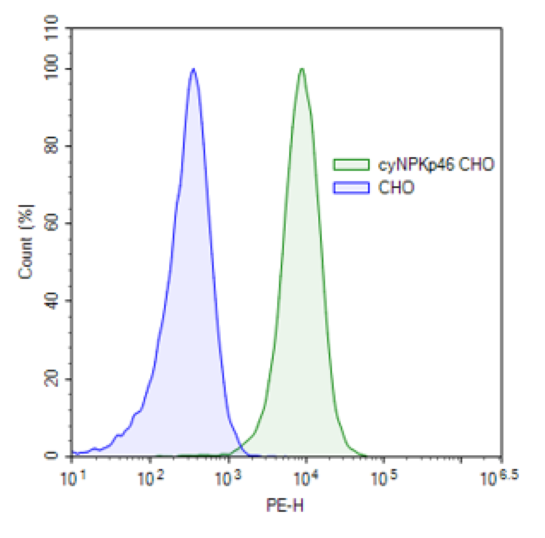78779
NKp46 Lentivirus (Macaca fascicularis/Cynomolgus)
BPS Bioscience
DESCRIPTION
The NKp46 Lentiviruses are replication incompetent, HIV-based, VSV-G pseudotyped lentiviral particles ready to transduce nearly all types of mammalian cells, including primary and non-dividing cells. These viruses transduce cells with Macaca fascicularis (also known as crab-eating macaque or cynomolgus monkey) NKp46 (Q95JB9.1) driven by an EF1A promoter. The lentiviruses also transduce a puromycin selection gene.
DETAILS
- Notes: To generate a NKp46 stable cell line, remove the growth medium 48 hours after transduction and replace it with fresh growth medium containing the appropriate amount of puromycin (as pre-determined from a killing curve), for an antibiotic selection of transduced cells. Visit: bpsbioscience.com/cell-line-faq for guidelines on performing a kill curve. Biosafety: None of the HIV genes (gag, pol, rev) will be expressed in the transduced cells, as they are expressed from packaging plasmids lacking the packing signal and are not present in the lentivirus particle. Although the pseudotyped lentiviruses are replication-incompetent, they require the use of a Biosafety Level 2 facility. BPS Bioscience recommends following all local federal, state, and institutional regulations and using all appropriate safety precautions. Troubleshooting Guide: Visit bpsbioscience.com/lentivirus-faq for detailed troubleshooting instructions. For further questions, email support@bpsbioscience.com.
- Shiptemp: -80°C (dry ice)
- Synonyms: CD335, Natural Cytotoxicity Triggering Receptor 1, Lymphocyte Antigen 94 Homolog, and Natural Killer Cell P46-Related Protein
- Warnings: Avoid freeze/thaw cycles
- Category: CAR T-Cell /Lentivirus
- Background: NKp46 (also known as Natural Cytotoxicity Triggering Receptor 1, NCR1, and CD335) is an important NK-activating receptor expressed on the surface of human NK (natural killer) cells, involved in cellular cytotoxicity. NKp46 participates in the activation of NK cells against pathogens, tumor cells, and virally infected cells; it also plays an important role in autoimmune conditions. NKp46 expression level can be used as a prognostic tool in acute myeloid leukemia (AML). Due to its crucial role in NK cell activity NKp46 has been used in multiple therapeutical approaches, such as trifunctional NK cell engagers (combined with CD16 and a cancer target) and strategies aimed at increasing NKp46 expression to generate higher NK cell-mediated cytotoxicity.
- Description: The NKp46 Lentiviruses are replication incompetent, HIV-based, VSV-G pseudotyped lentiviral particles ready to transduce nearly all types of mammalian cells, including primary and non-dividing cells. These viruses transduce cells with Macaca fascicularis (also known as crab-eating macaque or cynomolgus monkey) NKp46 (Q95JB9.1) driven by an EF1A promoter. The lentiviruses also transduce a puromycin selection gene.
- Formulation: The lentivirus particles were produced in HEK293T cells in medium containing 90% DMEM + 10% FBS. Virus particles can be packaged in custom formulations by special request, for an additional fee.
- Supplied As: Two vials (500 µl x 2) of lentivirus at a titer≥107 TU/ml. The titer will vary with each lot; the exact value is provided with each shipment.
- Unspsc Code: 41106621
- Unspsc Name: Virus mediated expression vectors or kits
- Applications: • Expression of NKp46 in cells of interest. • Generate stable cell lines expressing cynomolgus NKp46 (puromycin resistant).
- Product Type: Lentivirus
- Biosafety Level: BSL-2
- Related Products: 100465, 100466, 78715, 78717
- Storage Stability: Lentiviruses are shipped with dry ice. For long-term storage, it is recommended to store the lentiviruses at -80°C.
- Scientific Category: CAR T-Cell Therapy

